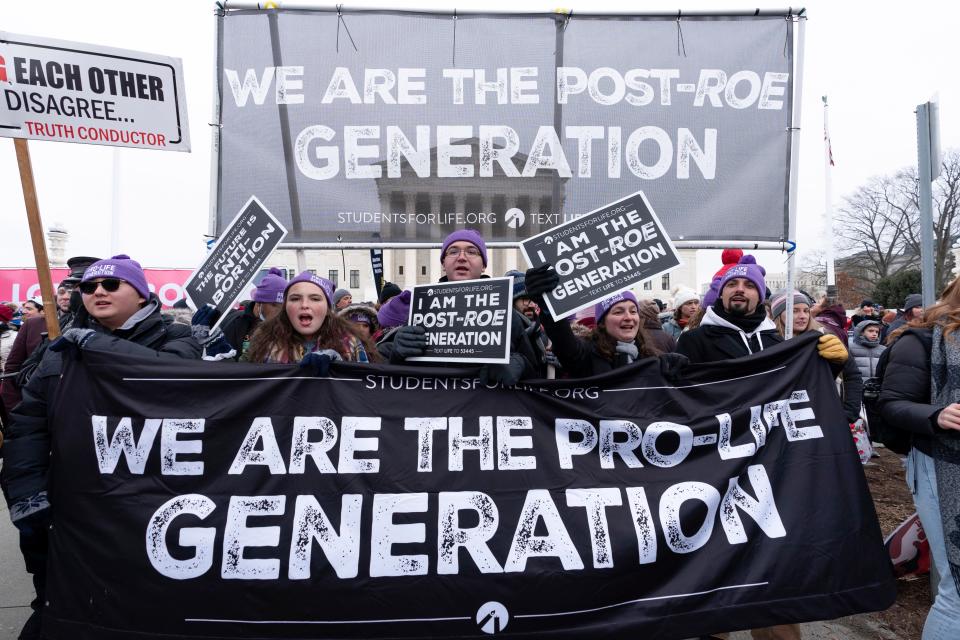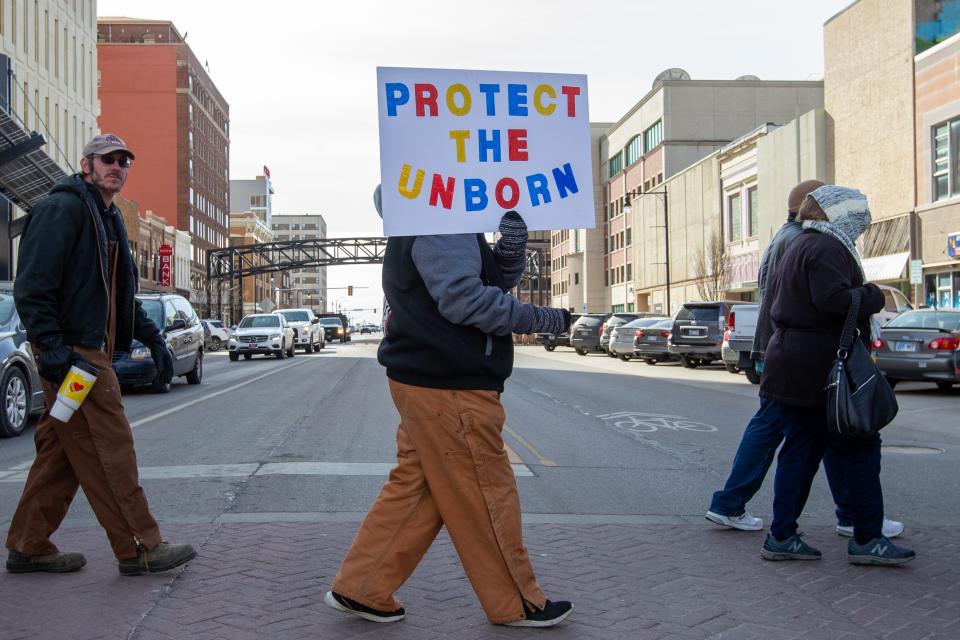Abortion opponents less accepting of rape and incest as 'exceptions.' What changed?
When Alabama approved an abortion ban in 2019 without exceptions for victims of rape and incest, it wasn’t just some prominent Republicans who disagreed with those exclusions. Televangelist Pat Robertson called the law “too extreme.”
But since then, rape and incest exceptions – once an accepted part of proposed abortion restrictions and supported by a series of Republican presidents, including Donald Trump – have been increasingly rejected by conservative state legislatures.
Rape and incest exceptions were excluded in 24 of 30 abortion bans and restrictions enacted by states including Arkansas, Kentucky, Texas, Arizona, Florida and Missouri in the past few years, according to the Guttmacher Institute, which tracks abortion laws.
Among 92 proposals for abortion restrictions pending in states this year alone, only a handful contained those exceptions, said Elizabeth Nash, a state policy analyst for Guttmacher, which supports abortion rights.
“The shift has been quite dramatic. Even five years ago, we would not have seen anti-abortion legislation that would not have exceptions for rape and incest,” said Michele Bratcher Goodwin, a law professor at the University of California, Irvine who heads the Center for Biotechnology and Global Health Policy.
IF ROE IS OVERTURNED: What happens in these states could be pivotal for abortion access
The exceptions once were often included as a way to gain legislative and public support for proposed restrictions, experts say. They say the shift is the result of the ascendant influence of lawmakers and groups who oppose exceptions, including for pregnancies conceived in violence.
Students for Life of America is one of the groups that has worked to exclude exemptions by arguing that “every human being has is worthy of love and worthy of life, no matter the circumstances of their conception," said Kristan Hawkins, the group's president.

Nash said many abortion opponents no longer see such exclusions as necessary to win passage of bans and restrictions, many of which are expected to take effect if the U.S. Supreme Court overturns Roe v. Wade.
That would further heighten existing barriers for women seeking abortion in circumstances of rape and incest, experts say, even though such exemptions are often difficult to utilize.
“We’re talking about women forced to carry pregnancies to term that they don't want,” said Goodwin, who noted that pregnancies caused by incest or rape can bring health and psychological harms.
ABORTION RIGHTS: Some Gen Z girls are worried about losing their abortion rights
Exceptions are difficult to use
Abortion rights advocates argue such exemptions don't mean that victims of violence have easy access to abortion.
In some cases, the victims are children whose abuser is their parent or guardian. And some exemptions require victims to make a police report before doctors would be allowed to perform an abortion.
"While an ‘exception’ may not always require a formal police report, too many of our legal systems are weighted against supporting victims. Mandates to report, document, or otherwise ‘prove’ one’s circumstances of becoming pregnant can be a trauma or a risk in and of itself," Nash said in a tweet thread.
Further, the debate over such exemptions "also pits ‘good' and 'bad’ reasons for abortions against one another” while distracting from a law or proposal’s larger effect on restricting access, Nash argued on Twitter.
“Survivors of rape and incest deserve to have every option available to them. They deserve compassion and support and access to abortion care that's affordable and timely, and doesn’t require police, legal paperwork, suspicion or interrogation,” she tweeted.
A Guttmacher study in 2004 found that about 1% of women surveyed who reported getting an abortion did so because of rape. Less than 0.5% did so because of incest. Those would number more than 8,600 abortions each year after cases of rape and 4,300 after cases of incest, based on Guttmacher’s estimate of 862,320 abortions nationwide in 2017, its latest figures available.
But that's probably an undercount. Less than one-third of an estimated 433,648 rapes and sexual assaults each year are reported to police, according to the Rape, Abuse & Incest National Network.
Last year, Missouri Democratic Rep. Cori Bush shared her experience with assault and abortion during a House Oversight Committee hearing.
Bush testified that in 1994, when she was 17, she was raped on a church trip to Mississippi. She soon learned she was pregnant and undertook “the hardest decision I had ever made.” She said she was glad she had options.
“I knew it was the right decision for me,” she said.

Abortion opponents push for an end to exceptions
For years, rape and incest exceptions have been part of the Hyde Amendment, which prohibits federal funds from being used to pay for abortions. That meant they were part of Medicaid coverage decisions in states, Nash said.
But today there is “less daylight” between the anti-abortion movement and the Republican Party, said Mary Ziegler, a Florida State University College of Law professor who studies the history of America’s abortion debates.
Hawkins, of Students for Life of America, said there has been a generational shift in the anti-abortion movement from viewing such exceptions as necessary to get bills passed.
“We don't have to give this concession away, which can undermine our entire belief (about abortion)," she said. "Either children in the womb are valuable or they're not."
'PILL ABORTION': Abortion by pill figures to rise if Supreme Court overturns Roe
In 2019, after the Alabama law sparked a backlash, Hawkins’ group and others wrote a letter to Republican officials asking them to “reconsider decades-old talking points” regarding exceptions for rape and incest.
The shift is showing up in some races in the midterm elections. Republican Senate candidate Herschel Walker of Georgia said he opposed exemptions, The Hill reported. J.D. Vance, the Republican Senate candidate in Ohio, said that “two wrongs don’t make a right.”
Ohio Republican Rep. Jean Schmidt sparked outrage during a hearing on an abortion bill earlier this year when she said a hypothetical teenager traumatized by rape would have the "opportunity" to help that child become a "productive human being."
Republican strategist and pollster Neil Newhouse, who expected both parties to paint each other as extreme on abortion in midterm elections, said abortion views haven’t changed greatly over the years among the public.
“I think the legislation has gotten ahead of where the voters are, even Republicans,” he said.
A Pew Research Center survey in May found 69% of Americans surveyed said abortion should be legal in the case of rape; that view was supported by 56% of Republican and Republican-leaning voters.
Last fall, after Texas passed its ban with no exceptions for cases of rape or incest, a Quinnipiac University poll found 77% of registered voters in Texas said abortion should be legal when a pregnancy is caused by rape or incest – including 92% or Democrats and 66% of Republicans.
POLL: Most Americans identify as pro-choice and believe abortion is 'morally acceptable'
Exceptions in a post-Roe world
Some key Republican legislators still support such exceptions, including Senate Minority Leader Mitch McConnell, a spokesman said. Arkansas Republican Gov. Asa Hutchinson said last month that the state's abortion law could be "revisited" to add rape and incest as exceptions if the Supreme Court overturns Roe v. Wade.
"While it's still life in the womb, life of the unborn, the conception was under criminal circumstances, either incest or rape, and so those are two exceptions I have to recognize I believe are very appropriate," he said recently on CNN.
Arkansas governor: Abortion law 'could be revisited' for rape and incest exceptions
How exceptions might play out if the Supreme Court strikes down Roe is complicated in part because some states have passed several bans of different types, often blocked by courts, with varying exceptions.
Conservative states that do retain rape and incest exemptions but adopt criminal penalties or Texas-style legal enforcement – allowing people to sue anyone abetting an abortion – may make women reluctant to seek care and doctors reluctant to provide it.
Idaho Gov. Brad Little wrote in a letter to the state’s Senate president after signing the bill that requirements to file a police report may “render the exception meaningless for many." The Republican governor also said family members of a rapist could sue abortion providers.
“I am particularly concerned for those vulnerable women and children who lack the capacity or familial support to report incest and sexual assault. Ultimately, this legislation risks retraumatizing victims by affording monetary incentives to wrongdoers and family members of rapists,” he wrote.
If the Supreme Court strikes down Roe, challenges for victims of rape and incest are likely to multiply as access is restricted particularly in the Midwest and South, said Carole Joffe, a professor and sociologist at the University of California, San Francisco, who studies abortion policy.
“The post-Dobbs environment for rape and incest victims and the health professionals who care for them is going to be extraordinarily difficult,” she said.
Chris Kenning is a national news writer on Twitter @chris_kenning
EXPERTS: Pregnancy-related deaths could rise 20% or more in states that outlaw abortion
This article originally appeared on USA TODAY: Abortion foes less accepting of rape and incest as 'exceptions'

